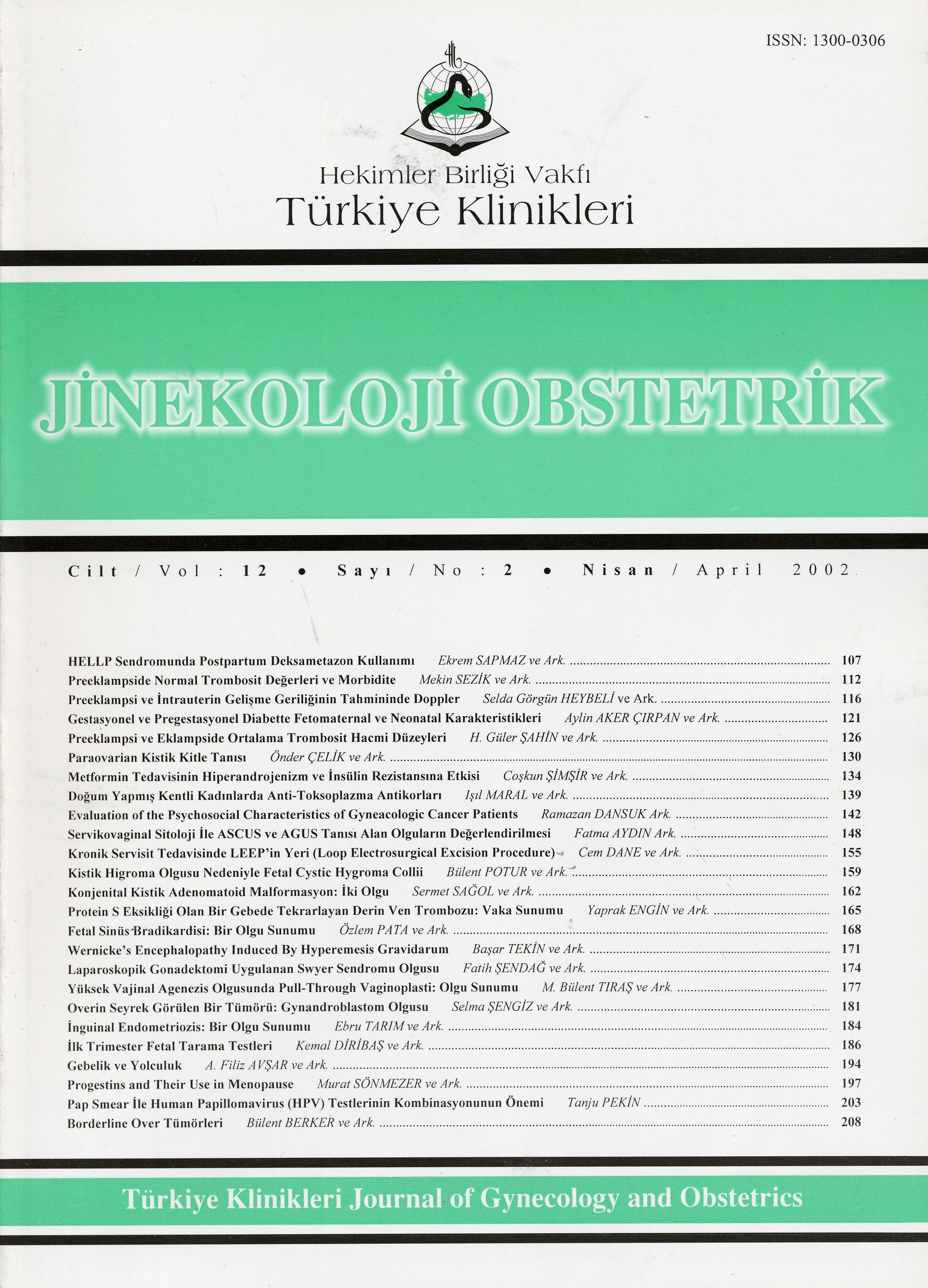Open Access
Peer Reviewed
ARTICLES
4143 Viewed1325 Downloaded
Wernicke's Encephalopathy Induced By Hyperemesis Gravidarum Associated with Hyperthyroidism
Hi̇pertroi̇di̇zm İle Seyreden Hi̇peremesi̇s Gravi̇darum'a Bağli Geli̇şen Werni̇cke Ensefalopati̇si̇
Turkiye Klinikleri J Gynecol Obst. 2002;12(2):171-3
Article Language: TR
Copyright Ⓒ 2025 by Türkiye Klinikleri. This is an open access article under the CC BY-NC-ND license (http://creativecommons.org/licenses/by-nc-nd/4.0/)
ÖZET
Amaç: Şiddetli hiperemesis gravidarum olgusunda, nadir olarak gelişen, tiamin eksikliği ve sonucunda gelişen Wernicke ensefalopatisi olgu sunumu.Çalışmanın yapıldığı yer : Osmangazi Üniversitesi Tıp Fakültesi, Kadın Hastalıkları ve Doğum AD, Eskişehir.Materyal ve Metod : 24 yaşında, ilk olarak , 12. gebelik haftasında, hiperemesis gravidarum tanısı alan ve uzun süre parenteral sıvı replasmanı alan olgu, servisimizde, 1 ay süre ile izlendi. Bulgular: Şiddetli hiperemesis gravidarum bulguları yanında, klinik olarak hipertiroidi saptanan olgunun özgeçmişinde, uzun süre ile, iv hidrasyon tedavisi aldığı öğrenildi. Akut başlangıçlı, diplopi, oryantasyon kaybı, vertikal nistagmus ve ataksik yürüyüş bulguları saptanan hastada, tiamine eksikliği düşünüldü. Günlük 600 mg, yüksek doz tiamin tedavisi yanında, uygun sıvıelektrolit desteği, antiemetik ilaç kullanımı ile, taburculuğuna kadar olgu izlendi. Tiamine tedavisine geçildikten 2 hafta sonra, nörolojik bulgularda gerileme görüldü. Obstetrik takipte herhangi bir özellik göstermeyen hasta, termde, spontan vajinal yol ile, 3020 gram kız bebek doğurdu. Perinatal bir komplikasyona rastlanılmadı. Yorum : Özellikle, uzun sıvı replasman tedavisi alan hiperemesis olgularında, tiamin replasmanı, Wernicke ensefalopatisi profilaksisi için önem kazanmaktadır.Anahtar Kelimeler: Hiperemesis gravidarum, Tiamine, Wernicke ensefalopatisiT Klin Jinekol Obst 2002, 12:171-173
Amaç: Şiddetli hiperemesis gravidarum olgusunda, nadir olarak gelişen, tiamin eksikliği ve sonucunda gelişen Wernicke ensefalopatisi olgu sunumu.Çalışmanın yapıldığı yer : Osmangazi Üniversitesi Tıp Fakültesi, Kadın Hastalıkları ve Doğum AD, Eskişehir.Materyal ve Metod : 24 yaşında, ilk olarak , 12. gebelik haftasında, hiperemesis gravidarum tanısı alan ve uzun süre parenteral sıvı replasmanı alan olgu, servisimizde, 1 ay süre ile izlendi. Bulgular: Şiddetli hiperemesis gravidarum bulguları yanında, klinik olarak hipertiroidi saptanan olgunun özgeçmişinde, uzun süre ile, iv hidrasyon tedavisi aldığı öğrenildi. Akut başlangıçlı, diplopi, oryantasyon kaybı, vertikal nistagmus ve ataksik yürüyüş bulguları saptanan hastada, tiamine eksikliği düşünüldü. Günlük 600 mg, yüksek doz tiamin tedavisi yanında, uygun sıvıelektrolit desteği, antiemetik ilaç kullanımı ile, taburculuğuna kadar olgu izlendi. Tiamine tedavisine geçildikten 2 hafta sonra, nörolojik bulgularda gerileme görüldü. Obstetrik takipte herhangi bir özellik göstermeyen hasta, termde, spontan vajinal yol ile, 3020 gram kız bebek doğurdu. Perinatal bir komplikasyona rastlanılmadı. Yorum : Özellikle, uzun sıvı replasman tedavisi alan hiperemesis olgularında, tiamin replasmanı, Wernicke ensefalopatisi profilaksisi için önem kazanmaktadır.Anahtar Kelimeler: Hiperemesis gravidarum, Tiamine, Wernicke ensefalopatisiT Klin Jinekol Obst 2002, 12:171-173
ANAHTAR KELİMELER: Hiperemesis gravidarum, Tiamine, Wernicke ensefalopatisi
ABSTRACT
Objective: A Wernickes encephalopathy case presentation, because of thiamine deficiency after severe hyperemesis gravidarum.Institution : Osmangazi University Faculty of Medicine, Department of Obstetrics of Gynecology, Eskişehir. Materials and Methods: A 24-year old case, initially diagnosed with hyperemesis gravidarum at 12th. weeks of gestation and being on long-term, intravenous fluid therapy, has been followed up in our clinic for one month.Findings: In addition to severe hyperemesis gravidarum signs, a relevant clinical hyperthyroidism is noticeable, with a long-term iv fluid therapy on history. Upon the detection of acute onset of diplopia, loss of orientation, diplopia, vertical nystagmus and ataxic gait, a thiamine deficiency was suspected. Together with high dose, 600 mg/day parenteral thiamine replacement, appropriate fluid therapy with antiemetics were initiated and sustained until her discharge. Two weeks following thiamine supplementation, her neurologic signs were regressed. She then delivered a healthy female fetus of 3020 gram without any perinatal obstetric complications.Conclusion: Thiamine supplementation is essential in hyperemesis gravidarum cases on long-term fluid therapy.
Objective: A Wernickes encephalopathy case presentation, because of thiamine deficiency after severe hyperemesis gravidarum.Institution : Osmangazi University Faculty of Medicine, Department of Obstetrics of Gynecology, Eskişehir. Materials and Methods: A 24-year old case, initially diagnosed with hyperemesis gravidarum at 12th. weeks of gestation and being on long-term, intravenous fluid therapy, has been followed up in our clinic for one month.Findings: In addition to severe hyperemesis gravidarum signs, a relevant clinical hyperthyroidism is noticeable, with a long-term iv fluid therapy on history. Upon the detection of acute onset of diplopia, loss of orientation, diplopia, vertical nystagmus and ataxic gait, a thiamine deficiency was suspected. Together with high dose, 600 mg/day parenteral thiamine replacement, appropriate fluid therapy with antiemetics were initiated and sustained until her discharge. Two weeks following thiamine supplementation, her neurologic signs were regressed. She then delivered a healthy female fetus of 3020 gram without any perinatal obstetric complications.Conclusion: Thiamine supplementation is essential in hyperemesis gravidarum cases on long-term fluid therapy.
MENU
POPULAR ARTICLES
MOST DOWNLOADED ARTICLES





This journal is licensed under a Creative Commons Attribution-NonCommercial-NoDerivatives 4.0 International License.










